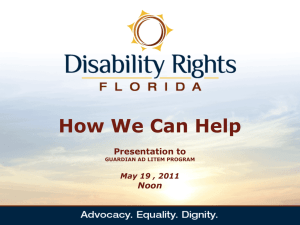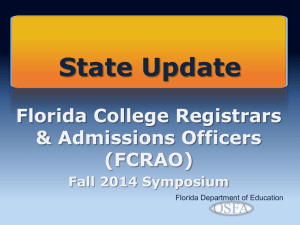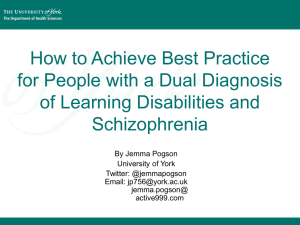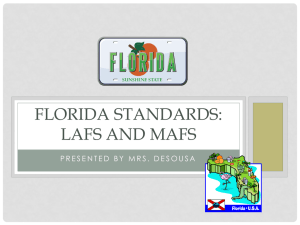Word (x) format - Florida State University / Dean of Students
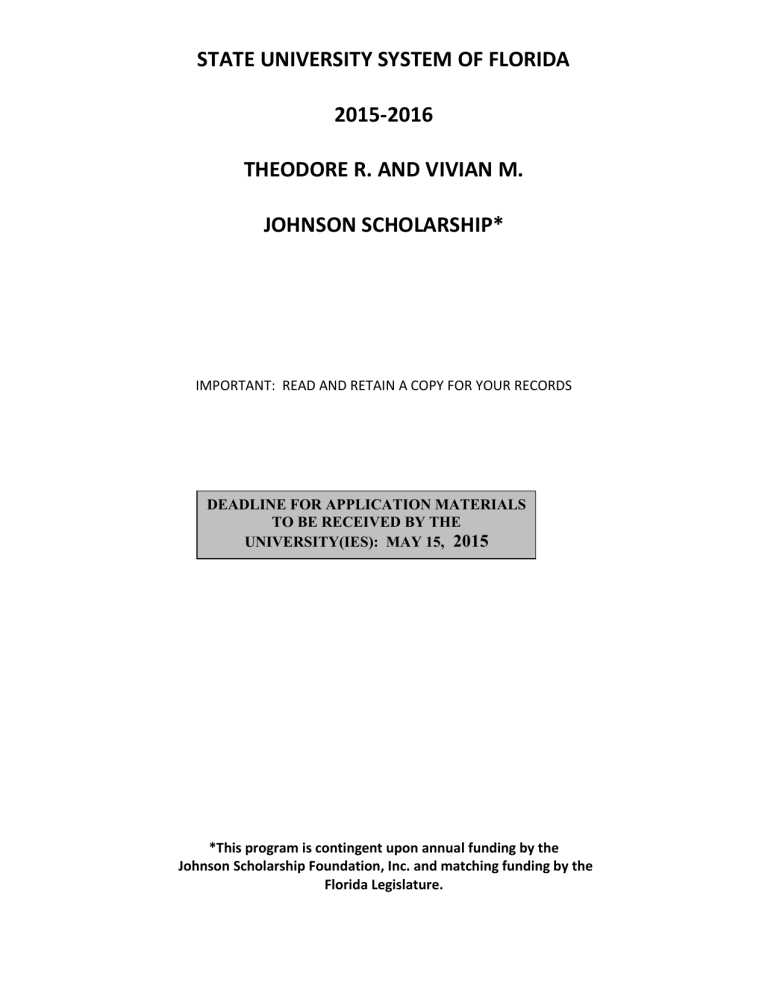
STATE UNIVERSITY SYSTEM OF FLORIDA
2015-2016
THEODORE R. AND VIVIAN M.
JOHNSON SCHOLARSHIP*
IMPORTANT: READ AND RETAIN A COPY FOR YOUR RECORDS
DEADLINE FOR APPLICATION MATERIALS
TO BE RECEIVED BY THE
UNIVERSITY(IES): MAY 15, 2015
202009
*This program is contingent upon annual funding by the
Johnson Scholarship Foundation, Inc. and matching funding by the
Florida Legislature.
The Johnson Scholarship, funded by the Johnson Scholarship Foundation, is a competitively awarded program which is available to undergraduate students with disabilities enrolled in a
State University System of Florida (SUS) institution. Students must meet the following requirements to be considered for scholarship selection:
Be a Florida resident for tuition purposes, based on Section 1009.21, Florida Statutes.
(Students who receive the out-of-state fee waiver are not eligible as they are not residents for tuition purposes);
Be seeking a first baccalaureate degree;
Complete a Theodore R. and Vivian M. Johnson Scholarship Application;
Meet academic requirements;
Provide documentation of the nature and/or extent of a disability; and
Submit a Free Application for Federal Student Aid (FAFSA) or Renewal FAFSA form by the required deadline and be determined to have unmet fiscal need. Students may submit a FAFSA at: https://fafsa.edu.edu
. Be sure that the Federal School Code for your university is designated so that the university has access to your results.
IF SELECTED, RECIPIENTS MUST:
Complete and return an acceptance form or contact by the date specified on your notification letter. Failure to return the acceptance form by the specified date will result in forfeiture of the award.
First-time recipients must participate in a Johnson Scholarship orientation.
Complete a minimum of nine (9) credit hours each semester.
Adhere to the minimum 2.0 cumulative grade point average requirement of this program.
FIRST-TIME APPLICANTS:
Initial applicants must provide an official current university transcript (not a photocopy) which documents a cumulative grade point average of at least 2.0 (on a 4.0 scale) on all credits. High school students who are applying for the scholarship in the first year of college should submit a current high school transcript.
Applicants must provide documentation of the nature and/or extent of a disability. The disability must be in one or more of the following classifications: Attention Deficit
Disorder/Attention Deficit Hyperactivity Disorder; Autism Spectrum Disorder; Blind or Low
Vision; Deaf/Hard of Hearing; Orthopedic Disability; Psychological, Emotional, or Behavioral
Disability; Speech/Language Disability; Specific Learning Disability; Traumatic Brain Injury; and/or Other Health Disabilities.
Appropriate documentation includes, but is not limited to, either a recent psychological evaluation used to determine eligibility for exceptional student services, school/medical records, certification by the Division of Blind Services, or a Vocational Rehabilitation eligibility determination. Documentation provided must meet the guidelines require by the institution in which the student is enrolled. Students must contact the University Office of Student Disability
Services for clarification as to what is required.
FIRST TIME APPLICANTS MUST SUBMIT A COMPLETED FAFSA BY APRIL 15, 2015, TO FEDERAL
STUDENT AID. THE FOLLOWING MUST BE SUBMITTED TO THE STATE UNIVERSITY:
A completed 2015-2016 Johnson Scholarship Application Form by the deadline;
A current official transcript (students applying as a first semester freshman should provide their high school transcript) showing a 2.0 grade point average;
Documentation of a disability(ies);
A personal statement (no more than one double-spaced page) pertaining to your achievements, activities, career goals, and the effects of your disability(ies);
Three letters of reference addressing your academic success and potential; and
University access to the FAFSA evaluation by Federal Student Aid.
NOTE: If you receive a Johnson Scholarship, you must still apply for renewal consideration for
each academic year in which you desire the award. Johnson Scholarship recipients may qualify for the award for up to twelve (12) semesters of undergraduate study.
RENEWAL APPLICANTS MUST SUBMIT A COMPLETED FAFSA BY APRIL 15, 2015, TO FEDERAL
STUDENT AID. TO QUALIFY FOR CONSIDERATION OF RENEWAL OF THE SCHOLARSHIP,
APPLICANTS MUST:
Continue to have unmet financial need based upon FAFSA;
Have completed at least 9 semester hours a semester, for a total of 18 semester hours;
Have maintained a cumulative grade point average (GPA) of at least a 2.0; and
Submit a completed 2015-2016 Johnson Scholarship Application form by the deadline to the scholarship coordinator at your state university.
APPLICATION PROCEDURES:
If you apply for admission at more than one SUS institution, submit completed Johnson
Scholarship application materials to each university. The application should be sent to the contact person listed at the end of this form. Applications, disability documentation, personal statements, letters of reference, and an official transcript must be received by the institution(s)
no later than May 15, 2015.
NOTIFICATION
All applicants will be notified of their status as Johnson Scholarship recipients, alternate award candidates, or as students who were not selected. Notification letters will be mailed in July to the permanent address which is specified on the application forms.
AWARD PAYMENT
After verification of enrollment, the university will disburse the award on a prorated basis each academic term to eligible Johnson Scholarship recipients. The dollar amount of the 2015-2016 awards is contingent upon the level of funding from the Johnson Scholarship Foundation and the Florida Legislature.
FOR ADDITIONAL INFORMATION:
Call or write the appropriate university representative listed on the last page.
State University System of Florida
Johnson Scholarship
funded by Johnson Scholarship Foundation
2015 – 2016 Application Form
This form and supporting application materials must be received by the appropriate State University
System of Florida (SUS) institution no later than May 15, 2015. Incomplete applications will not be considered. If you choose to apply to more than one SUS institution, you must submit complete application materials to each. Addresses are listed at the end of this form. You may e-mail the form but remember to also send any supporting information.
All applicants must also complete a 2015 – 2016 Free Application for Federal Student Aid (FAFSA) form or Renewal FAFSA form on-line or mail it to the address indicated on the FAFSA form by April 15, 2015 in order to receive full consideration.
PLEASE PRINT OR TYPE
Renewal Application
NAME:
Initial Application
Last
CURRENT ADDRESS:
Street Address
First Middle Initial
City
Telephone
CHECK ALL DISABLING CONDITION(S) THAT APPLY:
State Zip
CURRENT E-MAIL ADDRESS
Attention Deficit Disorder/Attention Deficit Hyperactivity Disorder. A chronic condition manifested by hyperactive and impulsive behavior, significant symptoms of inattention, or both. The behavior and symptoms have a significant impact on cognitive ability and academic functioning.
Autism Spectrum Disorder. Disabilities characterized by an uneven development profile and a pattern of qualitative impairments in social interaction, communication difficulties, and/or the presence of restricted repetitive or stereotyped patterns of behavior, interests, and activities. These characteristics may manifest in a variety of combinations and range from mild to severe.
Blind or Low Vision. Disabilities in the structure and function of the eyes as manifested by at least one of the following: visual acuity of 20/70 or less in the better eye after the best possible correction, a peripheral field so constricted that it affects one’s ability to function in an educational setting, or a progressive loss of vision that may affect one’s ability to function in an educational setting. Examples include, but are not limited to, cataracts, glaucoma, nystagmus, retinal detachment, retinitis pigmentosa, and strabismus.
Deaf/Hard of Hearing. A hearing loss of thirty (30) decibels or greater, pure tone average of
500, 1000, 2000, and 4000 hertz (Hz), unaided, in the better ear. Examples include, but are not limited to, conductive hearing impairment or deafness, sensorineural hearing impairment or deafness, high or low tone hearing loss or deafness, and acoustic trauma hearing loss or deafness.
Orthopedic Disability. A disability of the musculoskeletal system, connective tissue, or neuromuscular system. Examples include, but are not limited to, cerebral palsy, absence of some body member, clubfoot, nerve damage to the hand or arm, cardiovascular aneurysm
(CVA), head injury or spinal cord injury, arthritis or rheumatism, epilepsy, intracranial hemorrhage, embolism, thrombosis (stroke), poliomyelitis, multiple sclerosis, Parkinson’s disease, congenital malformation of brain cellular tissue, and physical disabilities pertaining to muscles or nerves, usually as a result of disease or birth defect, including, but not limited to, muscular dystrophy and congenital disorders.
Psychological, Emotional, or Behavioral Disability. Any mental or psychological disability including, but not limited to, organic brain syndrome, emotional or mental illness, or attention deficit disorders.
Speech/Language Disabilities. Disabilities of language, articulation, fluency, or voice that interfere with communication in academic settings, employment preparation/training or social interaction on campus. Examples include, but are not limited to, cleft lip or palate with speech disabilities, stammering, stuttering, laryngectomy, and aphasia.
Specific Learning Disability. A disability in one or more psychological or neurological processes involved in understanding or using spoken or written language. Learning disabilities may be manifested in listening, thinking, reading, writing, spelling, or performing arithmetic calculations. Examples include dyslexia, dysgraphia, dysphasia, dyscalculia, and other specific learning disabilities in the basic psychological or neurological processes. Such disabilities do not include learning problems that are due primarily to visual, hearing, or motor disabilities, to intellectual disabilities, to psychiatric or emotional disabilities or to an environmental deprivation.
Traumatic Brain Injury. An injury to the brain, not of a degenerative or congenital nature but caused by an external force, that may produce a diminished or altered state of consciousness, which results in impairment of cognitive ability or physical ability and functioning.
Other Health Disabilities. Any disability not identified in this subsection deemed by a disability professional to make completion of the requirement impossible.
CURRENT CUMULATIVE GPA: UNIVERSITY:
HAVE YOU BEEN ADMITTED TO THE UNIVERSITY? (check one) Yes No
2015 – 2016 ACADEMIC LEVEL (check one):
Freshman Sophomore Junior Senior
ANTICIPATED UNIVERSITY GRADUATION DATE:
I HAVE BEEN DESIGNATED AS A FLORIDA RESIDENT FOR TUITION PURPOSES BY THE UNIVERSITY
(check one):
______ Yes
______ No
______ Unsure
SELECTIVE SERVICE REGISTRATION
I am registered with the Selective Service
I am not required to be registered with the Selective Service because:
I am female.
I am in the armed services on active duty (Note: This exception does not apply to members of Reserve and National Guard units who are not on active duty).
I have not reached my 18 th birthday.
I was born before 1960.
I am a citizen of the Federated States of Micronesia, the Marshall Islands or a permanent resident of the Trust Territory of the Pacific Islands (Palau).
Other (please specify):
CITIZENSHIP STATUS (check one):
I am a U.S. citizen.
I am a permanent resident alien.
I am a non-U.S. citizen or non-permanent resident alien and possess the following category of VISA (specify):
ETHNIC ORIGIN (Check one. Failure to disclose will not disqualify your application):
Alaskan Native
Black (non-Hispanic)
White (non-Hispanic)
American Indian
Hispanic
Asian
Pacific Islander
I AM (select one below):
______ A FIRST-TIME UNDERGRADUATE DEGREE-SEEKING STUDENT
______ A TRANSFER STUDENT SEEKING MY FIRST BACCALAUREATE DEGREE
Checklist of Required Items to be Sent to the University for Initial (First Time) Application
Consideration:
Submit a completed 2015-2016 Johnson Scholarship Application submitted by the deadline;
A current official (not a photocopy) transcript;
Appropriate documentation of the nature and/or extent of a disability;
A personal statement pertaining to your achievements, activities, career goals; and
Three letters of references (none from relatives) addressing your academic success and potential.
You must also mail or complete an on-line FAFSA form to the address indicated on the
FAFSA form by April 15, 2015.
Checklist of Required Items to be Sent to the University for Renewal Application
Consideration:
Submit a completed 2015-2016 Johnson Scholarship Application by deadline;
NOTE: some universities are able to review your academic progress electronically and may not require you to send a transcript. Check with your university coordinator to determine if you need to send a transcript. Additionally, some institutions may require you to submit reference letters and/or a personal statement as in your first
application. Again, check with your institution’s coordinator; and
You must also mail or complete an on-line FAFSA form to the address indicated on the
FAFSA form by April 15, 2015.
I certify that I have read and understood the conditions for participation in this program. The information I am supplying in this application is true, complete, and correct. By signing the form, I also grant permission for information pertaining to my financial need, and all supporting application materials, to be released by the appropriate university to the Board of Governors Office for Academic and Student Affairs and Johnson Scholarship Foundation. NOTICE: If you purposely give false information, you may be subject to fine, or imprisonment, or both under 827.06, F.S.
Signature: Date:
SUBMIT APPLICATION MATERIALS TO THE APPROPRIATE CONTACT PERSON(S) LISTED AT THE
END OF THE APPLICATION.
Submit a completed application form and supporting materials to the appropriate contact(s) listed below:
Dr. Danette G. Saylor Dr. David A. Owens
Director, Center for Disability Access and Resources
Florida A&M University
Mr. Tim Ebener
Associate Director, Student
Disability Resource Center
ADA Consultant, Office of Diversity and Equal
Opportunity
667 Ardelia Court
Tallahassee, Florida 32307
Telephone: 850-599-3180
TDD: 850-561-2783
Fax: 850-561-2513
E-mail: danette.saylor@famu.edu
Florida State University
Director
Student Disability Resource Center
874 Traditions Way; 108 Student
Services Bldg.
Tallahassee, Florida 32306-4167
Telephone: 850- 644-9566
University of South Florida
4202 East Fowler Avenue,
ADM 172
Tampa, Florida 33620-6150
Telephone: 813-974-8616
Fax: 813-974-4375
E-mail: dowens@usf.edu
Dr. Michelle Shaw
Interim Director Student Affairs
Office for Students with Disabilities
Florida Atlantic University
Post Office Box 3091
777 Glades Road SU 133
Boca Raton, Florida 33431-0991
Telephone: 561-297-3880
TTY 561-297-0358 or 711
Fax: 561-297-2184
E-mail: mshaw@fau.edu
Fax: 850-644-7164
E-mail: tebener@fsu.edu
Ms. Meighen Hopton
Fax: 941-487-4256
Dr. Pamela Rea
Disability Coordinator, Counseling &
Wellness
New College of Florida
5800 Bayshore Road
Sarasota, Florida 34243
Telephone: 941-487-4254
Email: mhopton@ncf.edu
Assistant Director, Student
Dr. Vannee Cao-Nguyen
Director, Student Disability Resource
Center
University of West Florida
11000 University Parkway
Building 21/130
Pensacola, Florida 32514
Telephone: 850-474-2387
Fax: 850-474-2250
E-mail: vcao@uwf.edu
Ms. Cori Bright-Kerrigan
Director, Adaptive Services
Florida Gulf Coast University
10501 FGCU Boulevard, South
Fort Myers, Florida 33965-6565
Telephone: 239-590-7956
TYY: 239-590-7930
Fax: 239-590-7975
E-mail: Cbright-kerrigan@fgcu.edu
Ms. Amanda L. Niguidula
Director, Disability Resource Center
Florida International
University
GC 190 Modesto Madique Campus
11200 SW 8 th Street
Miami, Florida 33199
Telephone: 305-348-3532
Fax: 305-348-3850
E-mail: xniguidu@fiu.edu
Dr. Thomas Huber
Coordinator of Disability Services
Florida Polytechnic University
4700 Research Way
Lakeland, Fl 33805
Telephone: 863-874-8672
E-mail: THuber@FLPoly.org
Disability Services
University of Central Florida
Ferrell Commons 185
P.O. Box 160161
Orlando, Florida 32816-0161
Telephone: 407-823-2371
Fax: 407-823-2372
E-mail: pamela.rea@ucf.edu
Mr. Jim Gorske
Director, Disability Resource
Center
University of Florida
Building 0020 (Reid Hall)
Post Office Box 114085
Gainesville, Florida 32611-4085
Telephone: 352-392-8565
Fax: 352-392-8570
E-mail: jimg@dso.ufl.edu
Dr. Rusty Dubberly
Director, Disability Resource Center
University of North Florida
Building 57 Room 1500
1 UNF Drive
Jacksonville, Florida 32224-2645
Telephone/TDD: 904-620-2769
E-mail: r.dubberly@unf.edu
